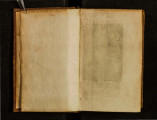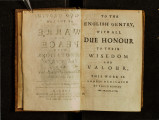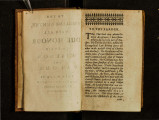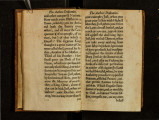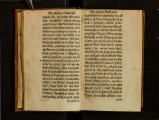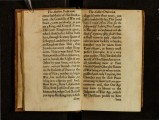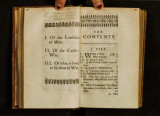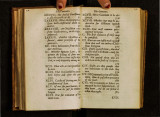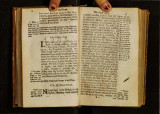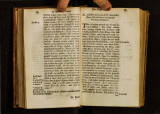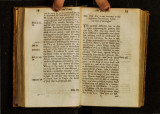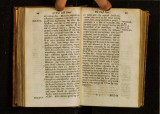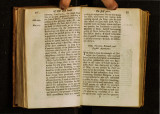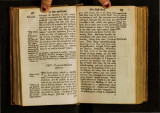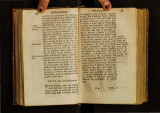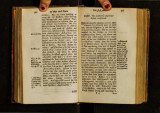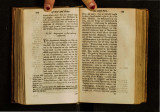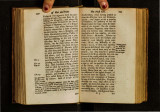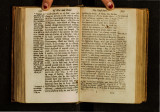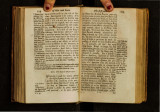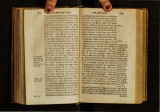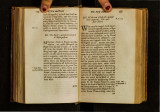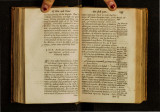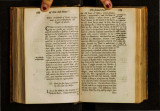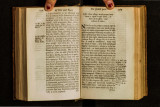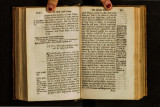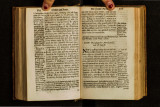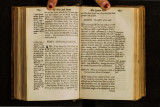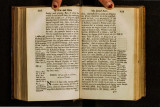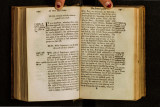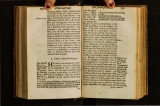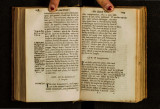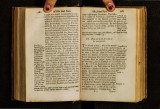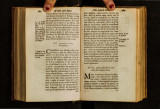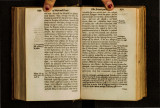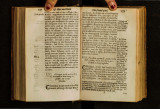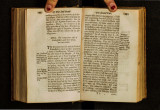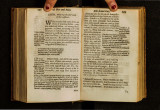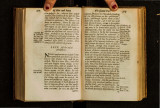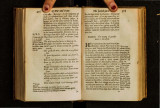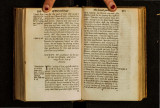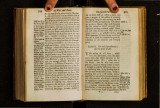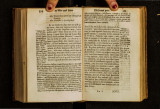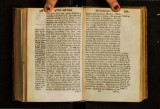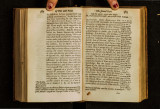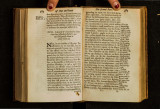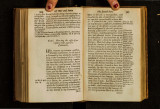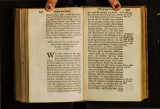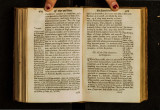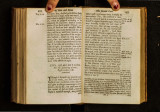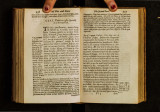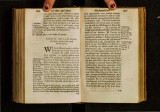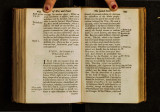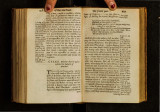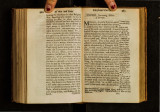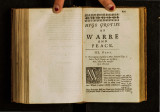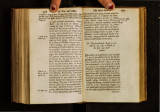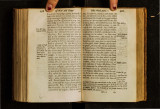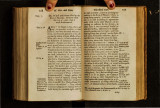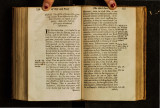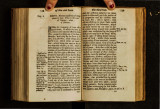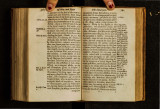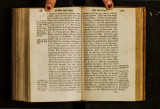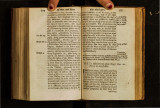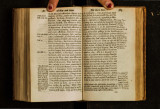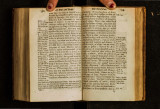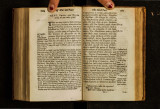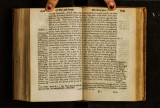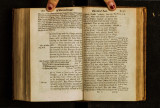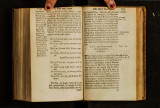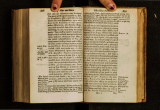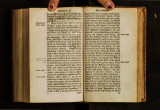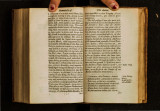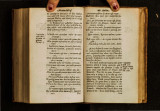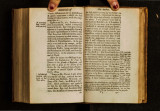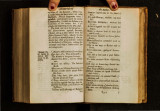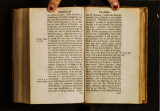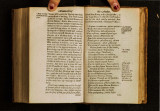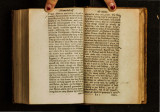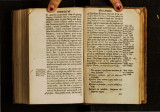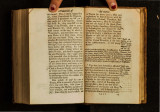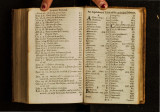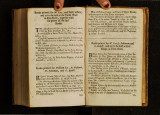| OCR Text |
Show +xo of War and Ptttct • L. prah~trtde • .cau[es: of whom that may be faid, which fell. ult. & is in ·the Roman Lawyers , He is a Robfiheq. ldtg. ~·de ber-t, who heintT askfd oft he caufe ofpof-ttre .petJt Ta- 6 b . J ./,u Herulorum in feffin~ , brzng s no ot h~r, ttt that he doth Longobardos, pojfofs. Arifrotle, of thoie• that perf wade n'A.•!Mt tloo~~ co war: t}11en, that oftentimes regard not ,,.0'• bellum at ail, whether it be jujf or no, to Jubdue ft ine pr~tcxtu. 1 . h l . ~ . hb S h Talu Silw · trJetr . arm e1 s tJetg . . ours. uc a one t Annibat, cui- wa.s Brennus, who iatd, Let the ftrongeft pro fxdc~e, * take all. Such a one was An.,ibat in· Siproq; fJull!cia1 .. /iu.r , Whofe right was his [word. Such eft en 1s. Tau r . . d r. h f Attila, & qtJi- aho w~s Atttla ; an mc are a 1 , that buJ t/lud in ore u fe thele words : No matter how the war bey_ins, If we can bri-ng'it to our ends. e(t, ~xr~cur belli exitUs , Noncaula.,Et; H:rc acics viBum fattur;t ~occnrem eft. To thefe men,' you may fitly apply that Et.: ln fu~1~ma of Auguftin: To wage w~~tr againjf the fo••. ,t una' Jdd x- r;ee:re,pf. t , and t he nce marc h on to ot he r s IZN d ijUJUS quo va~ ' lid ius. out of A- dejire of rule to conquer Nations " G~Hi apuq that provoke yoH not ~ what is it to be naL ·v:um_ f._Jn med~ but Great Ro/,bcry? In Cicero* we ~rmJl>&fe JllS. read : 7he hetght of mind, which is di[co· terre, omnJa 1 d . d . 1 l 1_ f . . forriu 11 viro - 'Ur tn angersana ae~ot~~rs,~ ttWa1JtJU· r um eft. ftice , is fo far from vertue , that 'tis ra· l.!~+ de civit. t her immanity t. a.nd an enemy to all hu' Ot~ ';.b6 ~ 11 . manit)'. Andronicus Rhodius ; Who,for to pe l t!ll • ot M · h · a h h V cl.' em. s.. Bell a btT atn muc , re~c czve. wn.en.ce t e7 ·o ug t. not, pon cauus ini- thefe are call d evtl, ~mptous and unJuft; u , fed p rou~ . · · eo rum me cts fu it. -s 0 ffic, ·r. 1' .A(athj~ lib. ~. Qui vera au~ Ju~ cri caufa aut czco odio,nullam h2bentes juftam querelam,alie~a~ i:et ras invadunr, innoxiis noxii, hi homines funt & fuperbi & iPlprobi. E.xempiUV' n~biJ da! iltuflre· Mmandtr p,-,eetlor: 'Baja:. flUS The fecoml · J!art~ 41..1 nus hY!:lrorum Chagaou~.,nulla occafione autoobtenru, ne cona~ tusquid(m caufam vel falfam comra Romanos.Comminifci, inve~ c~un~e plane'l.j b~ro~fl}~ in morem c:xu1t .paaa. J!.ch jtJ are tyrants~,and the Plttnd~~ers of* ·Bene PhilO:• Cities. Others do aJlede' caufes as it were ad I..>ecal~ ' 0 ' ' ' !5) . juilifick; which ' bein'g" weighed iii . he rgouf~r:m~~,ve-r 1 f h r r · . • , . u u vz es 1~a eo , riP t r~aJ oo are round un JUG :.ana naClifum,hi to· it app~au , as Livy fpeaks ~ not a con- ttU p1~dantur tention <1bout right , but an offer of vio- urfm ,pt;tnarum lence. Mflny KtnQS faith • Plutarch u[efi'cun ,qllld~~- tr ' ' · pra leges em~- the two ~ames of Peace and war_, not to nere vidtat:tMr. ·chat which is jufi, but to th'at wh}ch is Tales frmt expedient. · · \ homiJzeJ ingenio ' ; ~ -· tni11imt civili, . . , • dnminattmm & fD(e~lat~ 1vzd~,. mag~a furta cotmmttentts , qui prdcris nominibru magiftwuum & ~mper(~r~m id obtez.unt qrfod -rmi~ latrocinium •p., petleu~r.* Pyrrh~. •r 1 C ·V I I I. Fear of an uncertain dan: · , ger no juft caufe of war. AM on_g the unjufi caufes of war is fear •.. · taken from nel§hSoring power :W.hicl.t fear, we have faia above , is not fufficiem r I For ' that I?~fenfe rna y be jult ' it: ougHt ~ be necelfary : it is not fo, unlefs w~ be fure , not only of the power of a petg~bour, but. of his will : fure , by that . certat~ty , wh1ch hath place in rna crer of morality. Wherefore, their opinion is not to be ~llowd_, who make it a juG cau{eof. war, 1f a _netghbour,hindred by no agreement, bu1ld a Cafile on his own ground, 9f fo~e other fortification, which may fometime |




